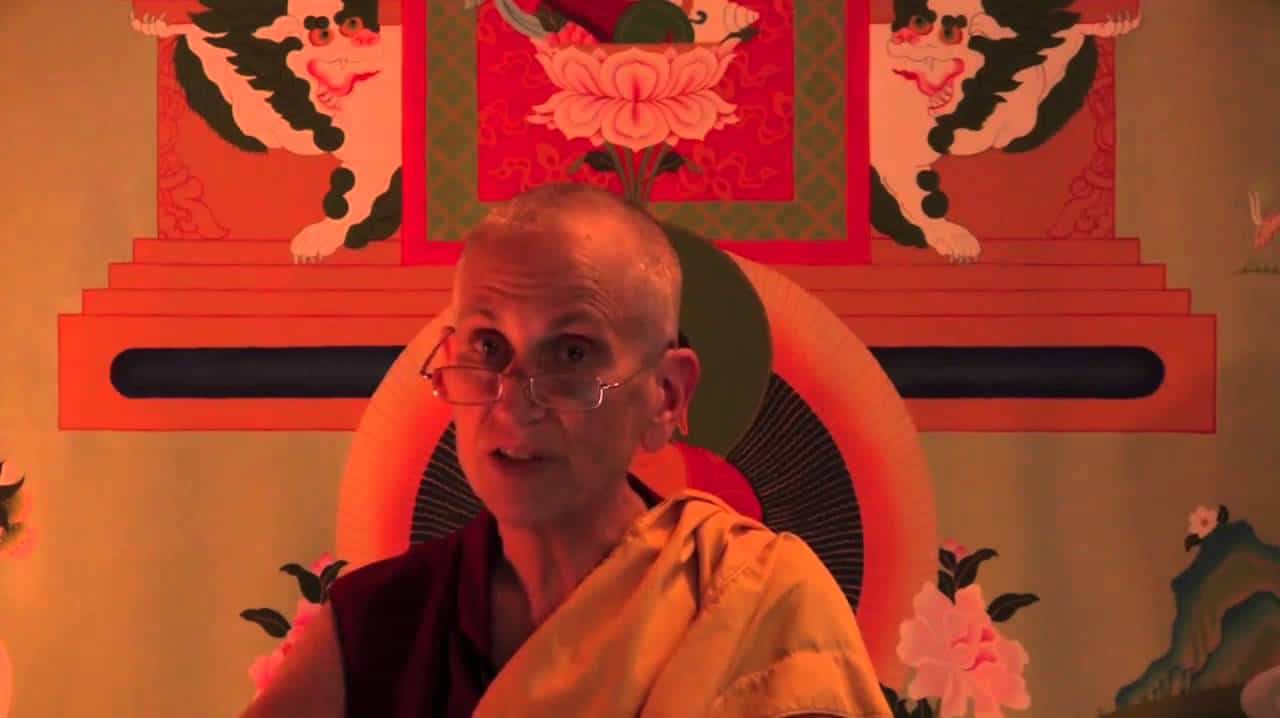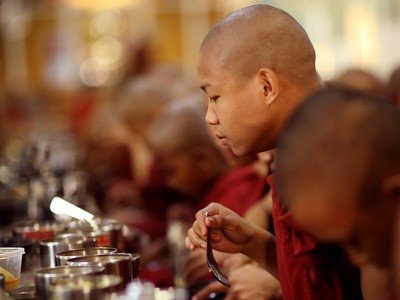Verse 50: The cantankerous old dog
Verse 50: The cantankerous old dog
Part of a series of talks on Gems of Wisdom, a poem by the Seventh Dalai Lama.
- The more we are praised, the more humble we should become
- Recall that all of our abilities and knowledge comes from others
- Reflect on the emptiness of the person being praised
- Rejoice in the virtue of the person doing the praising
Gems of Wisdom: Verse 50 (download)
“Who, like an old dog, becomes more cantankerous when treated well?”
Besides all of us.
Wait until you hear what the answer is.
“He who fills with pride when shown respect by others.”
Who, like an old dog, becomes more cantankerous when treated well?
He who fills with pride when shown respect by others.
Somebody who’s very attached to receiving respect and regard and laps it up, and their pride increases, and then they become more cantankerous because they think they’re really somebody big and somebody worthwhile and the world should wait on them. And so then they are like this [puffed up], and waiting for people to do something, and scolding people, and they’re really difficult to get along with because they have taken the pride with self-grasping and thinking that there’s a real self that all that pride refers to.
Whereas, somebody who is wise in the Dharma, the more they are praised the more humble they become. Because they realize that praise has nothing to do with the person who is praised and it has everything to do with the person who is doing the praising. Because the person who is doing the praising has a very virtuous mind. They see somebody’s good qualities, they remark on that, they want to share that, they feel joyful. The person who’s being praised, if you’re wise, you realized that it’s somebody else’s virtuous mind, you just happen to be the person they’re projecting this onto. Sometimes the praise may be helpful to give you some feedback that you need, if something is going well.
But, by and large, the more we receive praise the more we should realize that the praise is not about us. Because it’s not like we came out of the womb as some big know-it-all completely filled with good qualities. If somebody’s praising us for our knowledge, it’s due to the kindness of our teachers who taught us. If somebody is praising us for our looks, it’s due to the kindness of our parents and grandparents. If somebody’s praising us for skills we have, again, it’s due to people who taught us and encouraged us.
The praise that we receive is not really about us. It really should go to all the other people who helped us. And so a wise person, when they’re being praised—especially if you’re in the Dharma—then you recall the Buddha at your heart and you think that that person is praising the Buddha. Because it really, you know, doesn’t have much to do with you at all.
And especially if you contemplate, ask yourself, “Who is the person who is being praised?” What are you going to find? Where is this big “ME” that appears to be the most perfect one in the world? What or who is it? Where are you going to find it? When you search for it, what do you find? You find a body and you find a mind. Is our body praiseworthy? It’s filled with junk. Is our mind praiseworthy? It’s very often filled with garbage. So if somebody happens to be praising us…. First of all, there’s no real “I” there to be praised. But second of all, even the parts of the self, the basis of designation on the self…. We’re ordinary beings. So what’s there to praise?
In this way we keep ourselves humble and free of pride. And when we’re free of pride then we can learn much better, because we’re open and receptive. When we’re full of ourselves, and we think that we’re really the best Dharma student, or the best this and that who has the most potential, who’s going to be the most successful, who’s going to change the world with everything wonderful we have to contribute to it…. If we have that view of ourselves life is going to really knock us around, isn’t it? Because not everybody’s going to see us that way, first of all. Second of all, if we are succeeding in all of our big things, it doesn’t just depend on us. It depends on other people. And we can’t control them.
It’s just much better to be humble and be low-key rather than to be ostentatious, arrogant, “here I am for the world to worship.” That’s not going to go very far.
[In response to audience] And it pollutes any good you’re doing. Because you may be doing something good, but as soon as you get egotistical and arrogant about it, your motivation changes and becomes quite polluted. And so the good action you were doing before becomes….
[In response to audience] This doesn’t mean we develop low self-esteem. That’s not the point. Humility and low self-esteem are quite different. And when we have self-confidence we can have humility. When we have pride then when our pride gets deflated we flip to low self-esteem. So both of those are pretty extreme.
[In response to audience] Yes, sometimes it’s very difficult to recognize pride. Especially if you’ve excelled in a certain system (like the school system, or your work office system, or your sports system, whatever system you did) if you did well in that and a lot of people praised you and patted your back then it’s really easy to begin to think that you’re really hot stuff, without realizing that it all came from other people, and the kindness of other people. So the pride can be very difficult to recognize.
[In response to audience] What are indicators identifying pride? When you think that the world owes you something. When you think that, if only everybody followed your advice and did things your way that then the problems would be solved. Other people should listen to all my ideas and obey all my instructions because they’re mine and I always know best. Or people should always put me at the front of whatever it is and notice me and comment about how wonderful I am. So if you have those kinds of thoughts then that’s pretty indicative of pride I would say.
[In response to audience] Yes, it could flip the other way, into “I’m the most terrible one in the world.” That’s also a form of pride. And then there’s another form of pride that is we get pride by association. So it’s like, “I’m not so good, but my boss is really fantastic.” “I don’t know so much, but I’m the student of this really high lama.” You try and inflate yourself with being associated with somebody else who has more prestige. That’s also a form of pride.
[In response to audience] Yes, the body posture, tone of voice, how you put your arms [crosses arms]. All of this can change very much when somebody gets proud. And they’ve also done studies that people with a lot of pride, it’s very hard for them to have empathy for other people who haven’t had the same circumstances as they have.
[In response to audience] Yes. So you’re saying just if somebody comes and says to you, “Gee, are you a proud person?” You would probably say no. But then when you find your pride being pricked then you see this kind of (tension) come up, and you know that’s going to happen more on the daily small basis things.
[In response to audience] Yes, when somebody praises us we need to rejoice at their virtuous state of mind. Because when you’re being praised, you aren’t really benefiting. And you could be being harmed, you know, if your pride gets inflated. Whereas the person who can see the good qualities of others, they have a very good mental state. And it’s really lovely to see that, when people have that very positive mental state.
[In response to audience] Oh yes, there’s a big difference between praise and flattery. Praise you give because you want to give somebody some good feedback and help their confidence. Flattery is when we’re trying to get something out of somebody else.
Venerable Thubten Chodron
Venerable Chodron emphasizes the practical application of Buddha’s teachings in our daily lives and is especially skilled at explaining them in ways easily understood and practiced by Westerners. She is well known for her warm, humorous, and lucid teachings. She was ordained as a Buddhist nun in 1977 by Kyabje Ling Rinpoche in Dharamsala, India, and in 1986 she received bhikshuni (full) ordination in Taiwan. Read her full bio.


